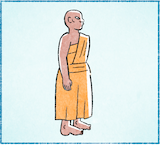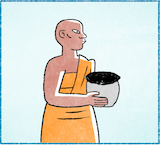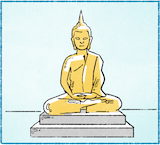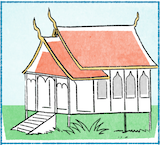




อันนี้เพิ่นเป็นพุใด เพิ่นเป็นพะ
เป็นหญังคือเอิ้นว่าพะ เป็นหญังคือเป็นพะ กะเพิ่นบวดแล้ว เพิ่นบวด กะเลยเอิ้นว่าพะ
กานเอิ้นกะสิมีสองแบบ ขั้นพุซายบวด สิเอิ้นว่าพะ ขั้นพุหญิงบวด หลือว่าแม่หญิงบวด สิเอิ้นว่าแม่ซี แต่ว่าอันนี้เพิ่นเป็นพุซาย กะเลยเอิ้นว่าพะ
พะเพิ่นใส่ซุดสีหญัง พะเพิ่นกะใส่แต่สีเดียว สีเหลียงหลือว่าสีส้มส่ำนั้นหละ บ่ให้ใส่สีอื่น สีแดง สีซมพู สีดำ เพิ่นบ่ให้ใส่ ให้ใส่แค่สีเดียว
2
พะเพิ่นกำลังเฮ็ดหญัง พะเพิ่นกำลังสิบินทะบาด พะเพิ่นกำลังสิไปบินทะบาด
บินทะบาดอยู่ใส กะอาดสิไปบินทะบาดลอบบ้าน หลือว่าอ้อมหมู่บ้านหนั้นหละ หม้องใดมีพุคน หลือว่ามีคนอยู่หนั้น เพิ่นกะสิไปบินทะบาดอยู่หั้น
ขั้นบ้านใดสิใส่บาด เพิ่นกะไปบ้านนั้น ขั้นบ้านใดบ่ใส่ เพิ่นกะญ่างผ่านไป
กานบินทะบาดของพะนี้กะสิไปแค่มื้อละเที่ย ไปแต่ญามเซ้า ตื่นขึ้นหกโมง ทำวัดอี่หยังเส็ด กะไปบินทะบาดญามมื้อเซ้า
แล้วญามเที่ยงพะสิออกไปบินทะบาดบ่ บ่ บ่ไป พะสิบินทะบาดเที่ยเดียว ญามเที่ยงญามแลงบ่บินทะบาดเนาะ
3
อันนี้คืออี่หยัง อันนี้กะเป็นพะพุดทะลูบ เป็นพะพุดทะลูบตั้งอยู่
พะพุดทะลูบเอาไว้เฮ็ดหญัง พะพุดทะลูบกะเอาไว้ถ้ากาบไหว้ เป็นที่กาบไหว้ของพุคน พุคนสิมักมากาบมาไหว้อยู่หม้องนี้ หลือว่าพุใดอยู่ใก้ อยู่แถวๆ นี้ กะสิมาไหว้พะพุดทะลูบอยู่หม้องนี้
พะพุดทะลูบนี้มีซีวิดบ่ บ่ พะพุดทะลูบบ่มีซีวิด เป็นสิ่งที่เฮ็ดขึ้นมา ปั่นขึ้นมา เพื่อให้เป็นสิ่งที่คนเคาลบหลือว่ากาบไหว้หนั้นหละ
4
อันนี้คืออี่หยัง อันนี้เป็นสาลา เป็นสาลาวัด หลือว่าสาลาปะเลียนนั้นหละ
พะอาดสิมาสันเข้า หลือว่าสันเข้าเซ้า สันเพน หลือว่าจำวัด จำสีนวัด กะเฮ็ดอยู่หม้องนี้เบิดซู่อย่าง อาดสิมีกิดจะกัม ชาวบ้านอี่หยังมาเฮ็ด กะอาดสิมาเฮ็ดกิดจะกัมอยู่นี้ เกี่ยวกับวัด เกี่ยวกับสาสะนา หลือว่าพะทัมเนาะ สิสามาดมาเฮ็ดได้อยู่หม้องนี้
แล้วสาลานี้ตั้งอยู่ใส สาลานี้กะตั้งอยู่ในวัด ส้างขึ้นอยู่ในวัด
5
อันนี้คืออี่หยัง อันนี้เอิ้นว่าเจดี หลือว่าพะทาดเจดีนั้นหละ แล้วแต่คนสิเอิ้น แล้วแต่คนสิเว้า
พะทาดหลือว่าเจดีนี้เฮ็ดมาจากอี่หยัง บางหม้องกะเฮ็ดมาจากดิน บางหม้องกะเฮ็ดมาจากปูน บางหม้องเฮ็ดมาจากเหล็กจากไม้ แล้วแต่สิเฮ็ด แล้วแต่คนสิคิดเฮ็ดว่า เฮ็ดแบบใด เฮ็ดจั่งใด เฮ็ดเพี่ยอี่หยัง ปะมานนั้นเนาะ
แล้วพะทาดหลือว่าเจดีนี้เป็นสิ่งสักสิดบ่ หลือว่าคนเคาลบ คนไหว้ คนกาบ คนหญังบ่ กะมีส่วนอยู่ บางเจดีกะเฮ็ดเพื่อให้คนเคาลบหลือว่านับถือ บางเจดีกะเฮ็ดเป็นหม้องที่ใส่กะดูกคนที่ตายไปแล้ว หลือว่ากะดูกของพะพุดทะเจ้า หลือว่ากะดูกของพะของคนที่ตายไปแล้วหนั้นหละ
Link to overview page
Link to dictionary
| Isaan | Pronunciation | Tones | Thai | English/Notes |
|---|---|---|---|---|
| อัน | an | M | อัน | 1. thing, object 2. general clf. for objects |
| นี้ | ni: | HF | นี้ | 1. this 2. here |
| เพิ่น | phən | H | คนอื่น, เขา, ท่าน | 1. someone, somebody 2. he, she, they 3. 3rd person pronoun used with Buddhist monks Notes: polite |
| เป็น | pen | M | เป็น | 1. to be, to exist 2. to be able to 3. to suffer, sth. happens to 4. เป็นหญัง[...]คือ in initial position: why? {เป็นหญังเขากะคือแปงฟัน = Why is he brushing his teeth?} {เป็นหญังเคี่ยงบินมันคือสิตก = Why is the airplane falling down?} |
| พุใด | phu-dai | H-M | ใคร | 1. who {มีพุใดโทมากะบ่ลู้ = I don't know who has called} {ห้องนอนของพุใด = whose bedroom (is this)? } 2. someone, somebody, anybody, in negative context: nobody {บ่มีพุใดอยู่กับเขาเลย = there's nobody with him} |
| พะ | pha | H | พระ | monk |
| หญัง | ɲaŋ | M | อะไร, เป็นหญัง = ทำไม | 1. what {เขากำลังเฮ็ดหญัง = What is he doing?} {ธูปเอาไว้เฮ็ดหญัง = What are incense sticks for?} 2. something, anything, (nothing) 3. เป็นหญัง[...]คือ in initial position: why {เป็นหญังเขาคือใส่บักพิกลงไปในกวยเตียว = Why is he putting chili in [his] noodle soup?} {เป็นหญังหน้าต่างมันคือเปิด = Why is the window open?} {เป็นหญังมันคือมีควนไฟ = Why is there smoke?} |
| คือ | khʉ: | HR | คือ | 1. to be, to resemble, like, as 2. why {บักหล้าคือบ่เก็บโต่ะแน่ = [addressing a young boy] Why haven't you cleared the table?} |
| เอิ้น | ə:n | HF | พูด, เรียก | to call, to say {เอิ้นง่ายๆ ว่า = in other words} {คนอี่สานเอิ้นว่า เป็นลูกคนกก = Isaan people call her ลูกคนกก} |
| ว่า | wa: | H | ว่า | 1. that, as {คำว่า X = the word X} 2. to say |
| กะ | ga | M | ก็ | 1. then, consequently 2. also |
| บวด | bu:at | LF | บวช | to be ordained (as a Buddhist monk) |
| แล้ว | lɛ:o | HF | แล้ว | 1. finished 2. already 3. and then, and next (especially แล้วกะ) 4. auxiliary for past tense |
| เลย | lə:i | HR | เลย | 1. futher on, beyond, past {เข็มน้อยเลยเลขสิบสองไป = the minute hand has passed number twelve} 2. too much 3. at all 4. definitively 5. completely, utterly |
| กาน | ga:n | M | การ | prefix indicating the action of ... |
| สิ | si | M | จะ | future tense auxiliary {เขากำลังสิตื่น = he's about to wake up} {สิไปตะหลาด = [I'm] going to the market} |
| มี | mi: | HR | มี | 1. to have 2. there is |
| สอง | sɔ:ŋ | M | สอง | two |
| แบบ | bɛ:p | LF | แบบ | 1. example, model, kind 2. style, form, pattern, design |
| ขั้น | khan | LF | เมื่อ | when, if |
| พุซาย | phu-sa:i | H-HR | ผู้ชาย | man, male |
| พุหญิง | phu-ɲiŋ | H-M | ผู้หญิง | woman, female |
| หลือ | lʉ: | M | หรือ | or |
| แม่หญิง | mɛ:-ɲiŋ | H-M | ผู้หญิง | woman, girl |
| แม่ซี | mɛ:-si: | H-HR | แม่ชี | nun |
| แต่ว่า | tɛ:-wa: | H-H | แต่ว่า | 1. but 2. only {ฮู้แต่ว่าเขายืนอยู่พุเดียว = I only know that he's standing there by himself} |
| ใส่ | sai | H | ใส่ | 1. to put something in/on {เขาใส่บักพิกในกวยเตียวหลาย = he's putting a lot of chili in his noodle soup} {เขาบีบยาสีฟันใส่แปงสีฟัน = he squeezes toothpaste on the toothbrush} {ก่องเอาไว้ใส่ของ = boxes are there to put stuff in} 2. to wear (clothes) {เขาใส่เสี้ยแขนญาว = he's wearing a long-sleeve} 3. directed at {เอิ้นใส่กัน = to call each other/to say to each other} {หมามันเห่าใส่แมว = the dog barks at the cat} {ล้องเพงใส่ไม = to sing into the microphone} {เขากำลังซี้มือไปใส่พุซาย = she's pointing at the man} |
| ซุด | sut | H | ชุด | dress, uniform {ซุดนักเลียน = school uniform} Notes: pronunciation: also realized as ชุด |
| สี | si: | M | สี | 1. color 2. colored pencil, crayon |
| แต่ | tɛ: | H | แต่ | 1. but {แต่บ่ต่างกันหลาย = but not very different} {แต่บ่ลู้ว่าเขาญ่างมาแต่ใส = but [I] don't know where he's coming from, see also: แต่ว่า} 2. only {ตอนนี้มีแต่ขี้ฝ้า = now there are only clouds} |
| เดียว | di:ao | M | เดียว | only, alone, single |
| เหลียง | li:aŋ | M | เหลือง | yellow |
| ส้ม | som | LF | ส้ม | 1. fruit: orange 2. color: orange |
| ส่ำนั้น | sam-nan | H-HF | แค่นั้น | 1. just that, only that 2. that much |
| หละ | la | M | แหละ, ล่ะ | 1. auxiliary for emphasis at the end of a phrase 2. auxiliary to create a follow-up question: And what about ... ? {แล้วลดคันที่สองหละ = And what about the second car?} |
| บ่ | bɔ: | H | ไม่ | 1. no, not 2. question particle, transforming a statement into a question Notes: spelling exception in line with common usage on social media |
| ให้ | hai | LF | ให้ | 1. to give {หมอกำลังเอายาให้คนป่วยกิน = the doctor is giving the patient medicine} 2. for 3. to allow, to be allowed |
| อื่น | ʉ:n | H | อื่น | other |
| แดง | dɛ:ŋ | M | แดง | red |
| ซมพู | som-phu: | HR-HR | ชมพู | pink |
| ดำ | dam | M | ดำ | 1. black 2. to transplant rice seedlings {ดำนา = to transplant rice seedlings} |
| แค่ | khɛ: | H | แค่ | only |
| กำลัง | gam-laŋ | M-HR | กำลัง | auxiliary indicating continuous or progressive action |
| เฮ็ด | het | H | ทำ | to do, to make |
| บินทะบาด | bin-tha-ba:t | M-H-LF | บิณฑบาต | (of a monk) to go with a bowl to receive food offerings |
| ไป | pai | M | ไป | 1. to go 2. auxiliary indicating action extending into the future |
| อยู่ | yu: | H | อยู่ | 1. to be (located) at 2. yet, still 3. auxiliary indicating continuous or progressive action {ทอดปาอยู่ในกะทะ = (in the process of) frying a fish in the pan} {แม่กำลังเมี้ยนเฮียนอยู่ = mother is cleaning/tidying up the house} |
| ใส | sai | M | (ที่)ไหน | 1. where? {สิไปใส = Where are [you] going?} {มาแต่ใส = Where are [you] coming from?} {กะทะอยู่ใส = Where's the pan?} 2. somewhere, anywhere {ใสกะได้ = anywhere, wherever you like} |
| อาด | a:t | LF | อาจ | 1. might, may, will 2. likely |
| ลอบ | lɔ:p | HF | รอบ | around |
| บ้าน | ba:n | HF | บ้าน | 1. house, home 2. village (also used as a prefix before the name of a village) 3. home country, home region {บ้านเฮาเฮ็ดเข้าจั่งใด = How do we plant rice in Isaan/Thailand?} |
| อ้อม | ɔ:m | HF | อ้อม | 1. around 2. to encircle |
| หมู่บ้าน | mu:-ba:n | H-HF | หมู่บ้าน | village |
| หนั้นหละ | nan-la | LF-M | นั่นแหละ | auxiliary for emphasis at the end of a phrase Notes: possibly a variant of นั้นหละ |
| หม้อง | mɔŋ | LF | ที่, แห่ง, บริเวณ | 1. place, area {หลายที่หลายหม้อง = in many places} {หม้องใดหม้องหนึ่ง = some place} 2. clf. for places |
| ใด | dai | M | ใด | 1. which, that one which, what, how {เขานั่งแบบใด เขานั่งขดตะหมาดอยู่ = How is he sitting? He's sitting cross-legged.} {ตอนใด = when?} 2. whichever, whoever {หม้องใดหม้องหนึ่ง = some place, somewhere} {ขั้นเฮาอยากตื่นญามใด เฮากะตั้งเวลาปุกญามนั้น = If we want to get up at a certain time, we set the alarm to that time} Notes: sentence-final often with a marked rising tone |
| พุ | phu | H | ผู้ | 1. person 2. clf. for people {พุหญิงพุหนึ่ง พุซายพุหนึ่ง = a woman, a man} {ซู่พุซู่คน = everybody} {พุหนึ่งโตจ่อยๆ พุหนึ่งโตบักอ้วนหนึ่ง = one person is slim, the other is fat} Notes: pronunciation: also realized as พู่- |
| คน | khon | HR | คน | person, people |
| หนั้น | nan | LF | นั้น | that, there Notes: possibly a variant of นั้น or หั้น |
| หั้น | han | LF | ที่นั่น | there, over there |
| บาด | ba:t | LF | บาตร | alms bowl {ใส่บาด = to put food offerings in a Buddhist monk's alms bowl} |
| นั้น | nan | HF | นั้น | that, there |
| ญ่าง | ɲa:ŋ | H | เดิน | to walk {เขากำลังญ่างเว้ากัน = they are walking and talking} {ลูกเป็ดญ่างไปนำแม่เป็ด = the ducklings are [walking] following their mother} {เขากำลังญ่างข้ามสะพาน = she's walking over the bridge} {เขาสิญ่างไปใส = Where is he going?} |
| ผ่าน | pha:n | H | ผ่าน | to pass |
| ของ | khɔ:ŋ | M | ของ | of, belonging to |
| มื้อ | mʉ: | HF | วัน | day |
| ละ | la | H | ละ | each, per, every |
| เที่ย | thi:a | H | ครั้ง, เที่ยว | clf. for times, rounds {บางเที่ย = sometimes} |
| ญาม | ɲa:m | HR | ยาม | 1. period of time {ญามมื้อเซ้า = morning} {ญามเที่ยง = noon} 2. when, while {ญามทอด ต้องใซ้น้ำมันพ้อม = one needs to use oil when frying} {ญามสิออกไปข้างนอกกะต้องใส่เกิบ = when one goes out, ones has to wear shoes} |
| เซ้า | sao | HF | เช้า | morning Notes: see also มื้อเซ้า, เข้าเซ้า |
| ตื่น | tʉ:n | H | ตื่น | to wake up |
| ขึ้น | khʉn | LF | ขึ้น | 1. to go up, to increase 2. sun: to rise {ตะเว็นกำลังขึ้น = the sun is rising} 3. more 4. bus/train etc.: to get on, to board {พุโดยสานขึ้นลดไฟเบิดแล้ว = all passengers have boarded the train} |
| หก | hok | M | หก | six |
| โมง | mo:ŋ | HR | โมง | o'clock, hour {ตอนนี้เวลาจักโมงแล้ว = What time is it?} {ตอนนี้เวลาห้าโมงเคิ่ง = It's half past five.} |
| ทำ | tham | HR | ทำ | to do |
| วัด | wat | H | วัด | temple, Buddhist temple |
| อี่หยัง | i:-yaŋ | H-M | อะไร | 1. what {นี้คืออี่หยัง = What is this?} {มื้อนี้เจ้าเฮ็ดอี่หยัง = What are you doing today?} {กินเข้างายกับอี่หยัง = What did you have for breakfast?} 2. something, anything, (in negations) nothing {บ่ต้องเฮ็ดอี่หยังอีกเลยนอกจากใส่ปุย = [we] don't need to do anything besides adding fertilizer} |
| เส็ด | set | M | เสร็จ | finished, completed, done {พอเว้ากันเส็ด [...] = having finished talking, [...]} |
| มื้อเซ้า | mʉ:-sao | HF-HF | เช้า | morning |
| เที่ยง | thi:aŋ | H | เที่ยง | noon |
| ออก | ɔ:k | LF | ออก | 1. to go out, to leave 2. out |
| แลง | lɛ:ŋ | HR | เย็น | evening Notes: see also มื้อแลง, เข้าแลง |
| เนาะ | nɔ | H | เนาะ | final particle: makes the statement softer, looking for agreement |
| พะพุดทะลูบ | pha-phut-tha-lu:p | H-H-H-HF | พระพุทธรูป | Buddha statue, Buddha image |
| ตั้ง | taŋ | HF | ตั้ง | to set/put up, to install, to establish, to erect {เขาตั้งนาลิกาปุกตอนสองโมงเซ้า = he sets the alarm clock to eight o'clock in the morning} {พัดลมตั้งโต่ะ = table fan} {ทะนาคานมันสิไปตั้งไว้อยู่ซู่หม้องเอาโลด = banks are [established/can be found] everywhere!} {ตั้งไฟ = to set up a fire} |
| เอา | ao | M | เอา | to take, to give {เขากำลังเอาก่องไปซั่ง = he's taking the boxes to weigh them} {หมอกำลังเอายาให้คนป่วยกิน = the doctor is giving medicine to the patient} {เอาไว้ถ้า = is for, is used for, has the purpose of} |
| ไว้ | wai | HF | ไว้ | 1. to keep, to put, to place, to retain, to save, to reserve {เขาเอาหัวของเขาไว้ใส = Where does she put her head?} {หมาสิเลี้ยงไว้บ้าน = dogs are kept/raised in the house} {ไก่เลี้ยงไว้ในคอก = chicken are kept/raised in a coop} {หน้ามันบังไว้ = the face is covered/not visible} {เขาเอาโทละสับวางไว้หู = he holds the phone to his ear} 2. for {นาลิกาปุกมีไว้เฮ็ดหญัง = What is an alarm clock for?} {หม้อเอาไว้เฮ็ดแนวกิน = a pot is used to make food} {ก่องเอาไว้เฮ็ดหญัง ก่องเอาไว้ใส่ของ = What is the box for? It's for putting in stuff.} Notes: see also ไว้ถ้า |
| ไว้ถ้า | wai-tha: | HF-LF | usually in a positive statement or answer: is for, is used for, has the purpose of {กะทะมีไว้ถ้าทอด = a pan is for frying} {น้ำบักนาวมีไว้ถ้าปุงอาหาน = lime juice is used to season food} {ปากกามีไว้ถ้าเขียน = a pen is for writing} {กะเทียมเอาไว้ถ้าเฮ็ดแนวกิน = garlic is used to make food} {ขาเอาไว้ถ้าญ่าง = legs are for walking} {เกิบเอาไว้ถ้าใส่ = shoes are for wearing} Notes: see also ไว้ |
|
| กาบ | ga:p | LF | กราบ | to prostate oneself |
| ไหว้ | wai | LF | ไหว้ | to salute, to greet, to pay respect |
| ที่ | thi: | H | ที่ | 1. in/at {ที่นี้= here} 2. place {สิมีขายอยู่หลายที่หลายหม้อง = it is being sold in many places} {ที่นอน = sleeping place} 3. clf. for places |
| มัก | mak | H | ชอบ | to like, to love, to want, to desire |
| มา | ma: | HR | มา | 1. to come 2. auxiliary expressing action towards the present or focal time {กะคุเฮ็ดมาจากอี่หยัง = What is the bucket made of?} {แล้วเขากะเก็บเงินจากพุนั้นมา = and then she takes the money of that person} |
| ใก้ | gai | HF | ใกล้ | near, close |
| แถว | thɛ:o | M | แถว | vicinity, area, neighborhood |
| ซีวิด | si:-wit | HR-H | ชีวิต | life Notes: also pronounced ชีวิด [chi:-wit] |
| สิ่ง | siŋ | H | สิ่ง | thing, object |
| ที่ | thi: | H | ที่ | 1. that, which {คนที่ยืนอยู่ฝั่งขวา = the person which is standing on the right = the person standing on the right} {เว้าคำที่บ่สุพาบ = to speak words which are impolite = to speak impolitely} 2. for ordinal numbers {ที่สาม = third} |
| ปั่น | pan | H | ปั่น | to sculpture, mold, model |
| เพื่อ | phʉ:a | H | เพื่อ | for Notes: the vowel เอือ is likely to be a Thai loan; pronunciation: also realized as เพี่ย |
| เคาลบ | khao-lop | HR-H | เคารพ | to respect, to honour, to value |
| สาลา | sa:-la: | M-HR | ศาลา | pavilion, hall |
| สาลาวัด | sa:-la:-wat | M-HR-H | ศาลาวัด | pavilion at a temple |
| ปะเลียน | pa-li:an | M-HR | การเปรียญ | sermon hall in a temple or monastery |
| นั้นหละ | nan-la | HF-M | นั่นแหละ | auxiliary for emphasis at the end of a phrase |
| สัน | san | M | ฉัน | to eat (used with Buddhist monks) |
| เข้า | khao | LF | ข้าว | rice {กินเข้า = to eat} {ปูกเข้า, เฮ็ดเข้า = to grow/plant rice} {เกี่ยวเข้า = to harvest rice} {กับเข้า = courses eaten with rice} |
| เพน | phe:n | HR | เพล | midday meal of Buddhist monks, eaten before noon |
| จำ | jam | M | จำ | 1. to remember, to memorize 2. to observe the Buddhist precepts {จำสีน = to observe the Buddhist precepts} |
| สีน | si:n | M | ศีล | religious or moral precept, commandment |
| เบิด | bə:t/bət | LF/M | หมด | 1. completely, totally, entirely {เทิงเบิด = all of them} {เบิดมื้อเบิดค่ำ = [all] day and night} {ขั้นพุโดยสานลงลดไฟเบิดแล้ว [...] = when all passengers have disembarked […]} {เขากินเบิดบ่ = Has he eaten all of it?} 2. to be finished, to be exhausted, to come to an end, to have no more {โน่ดบุ่กแบ็ดเบิด = the notebook is out of battery/the notebook needs recharging} |
| ซู่ | su: | H | 1. all, entire 2. every, any {ซู่พุซู่คน = everybody} {ซู่สิ่งซู่อย่าง = everything} {ไก่ต้องกินเข้าซู่มื้อ = chicken need to eat every day} {ซู่คนสิมีขาเอาไว้ถ้าญ่าง = everybody has legs to walk} |
|
| อย่าง | ya:ŋ | H | อย่าง | type, kind, sort, category |
| กิดจะกัม | git-ja-gam | M-M-M | กิจกรรม | activity, event |
| ชาวบ้าน | cha:o-ba:n | HR-HF | ชาวบ้าน | villager Notes: pronunciation: also realized as ซาวบ้าน |
| เกี่ยวกับ | gi:ao-gap | H-M | เกี่ยวกับ | about, regarding, pertaining to |
| สาสะนา | sa:-sa-na: | M-M-HR | ศาสนา | religion |
| พะทัม | pha-tham | H-HR | พระธรรม | Buddha's teaching, sermon |
| สามาด | sa:-ma:t | M-HF | สามารถ | can, to be able |
| ได้ | dai | HF | ได้ | 1. can 2. to get, to obtain 3. before verb: indicating past tense 4. บ่ได้ + verb: not |
| ใน | nai | HR | ใน | in, within |
| ส้าง | sa:ŋ | LF | สร้าง | to build {ส้างบ้านส้างเฮียน = to build a house} |
| เจดี | je:-di: | M-M | เจดีย์ | stupa |
| พะทาด | pha-tha:t | H-HF | พระธาตุ | 1. relics 2. Buddha's relics 3. stupa {พะทาดเจดี = stupa} |
| แล้วแต่ | lɛ:o-tɛ: | HF-H | แล้วแต่ | up to, depending on |
| เว้า | wao | HF | พูด | to say, to speak, to talk |
| จาก | ja:k | LF | จาก | 1. from {... เฮ็ดมาจากอี่หยัง = ... is made from what?} 2. to depart |
| บาง | ba:ŋ | M | บาง | 1. some {สัดบางโตบ่มีขา = some animals don't have legs} {บางคนสิมักกินกวยเตียวแทนเข้า = some people like to eat noodle soup instead of rice (dishes)} {บางสิ่งบางอย่าง = something, anything} 2. thin |
| ดิน | din | M | ดิน | earth, soil |
| ปูน | pu:n | M | ปูน | cement {บ้านปูน = house with stone walls, as opposed to บ้านไม้} |
| เหล็ก | lek | M | เหล็ก | iron, steel, metal |
| ไม้ | mai | HF | ไม้ | wood, tree |
| คิด | khit | H | คิด | 1. to think 2. to calculate {คิดเงิน = to calculate the price} |
| จั่งใด | jaŋ-dai | H-M | ยังไง, แบบไหน | how, in what manner {บักนาวมันมีลดซาดจั่งใด = Lime fruits have what kind of taste?} {เขาปิดแอจั่งใด = How is he switching off the A/C?} {เทียนใซ้จั่งใด = How's a candle used?} {สิใซ้จั่งใด = how is [it] used?} |
| เพี่ย | phi:a | H | เพื่อ | for Notes: alternative pronunciation of เพื่อ |
| ปะมาน | pa-ma:n | M-HR | ประมาณ | 1. about, approximatively 2. to guess, to estimate |
| สักสิด | sak-sit | M-M | ศักดิ์สิทธิ์ | sacred, holy |
| ส่วน | su:an | H | ส่วน | part, portion |
| นับถือ | nap-thʉ: | H-M | นับถือ | to worship, honour, respect, revere |
| กะดูก | ga-du:k | M-LF | กระดูก | bone |
| ตาย | ta:i | M | ตาย | to die |
| พะพุดทะเจ้า | pha-phut-tha-jao | H-H-H-HF | พระพุทธเจ้า | Buddha |